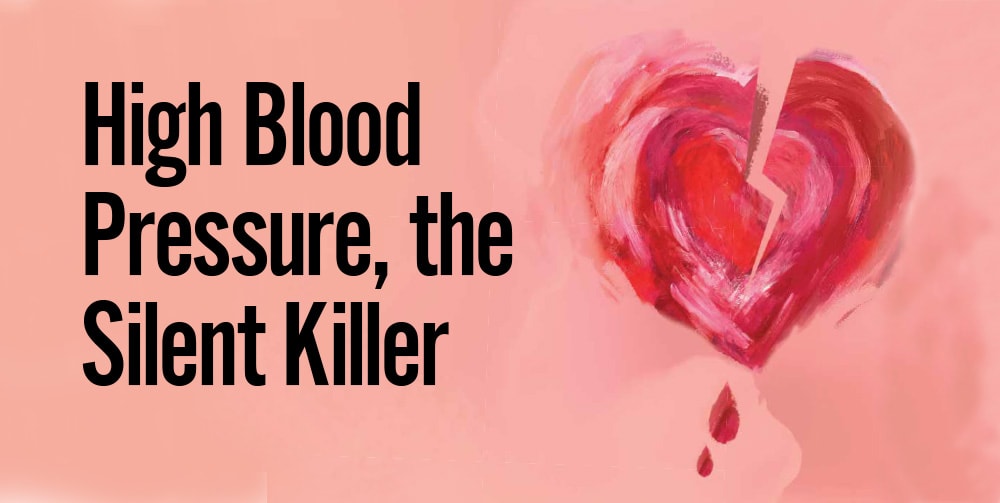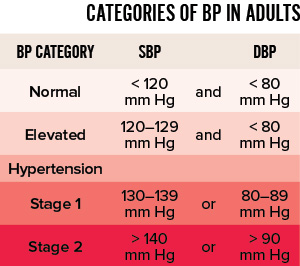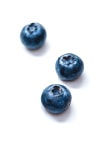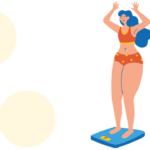
Hypertension is known as the “silent killer” because the symptoms often do not occur until the damage is advanced. Understanding how to support healthy blood pressure can prevent many unwanted conditions associated with hypertension, such as cardiovascular disease (CVD), stroke, kidney damage, and other complications.
In 2017, the American Heart Association (AHA) and American College of Cardiology (ACC) changed the cutoff for hypertension from 140/90 to 130/80 mm Hg in their new guidelines. The reason was that the risk of cardiovascular problems increases continuously once blood pressure rises above about 120/80.
However, not everybody agrees with the latest definitions. Hypertension Canada reviewed the same studies, but decided not to endorse the new guidelines. Their reasons were about benefit versus risk of treating hypertension with medication in these lower targets. There is a general agreement; however, that blood pressure above 120/80, but below 140/90 (stage 1) confers “moderate” risk vs. “high” risk at, or above, 140/90 (stage 2).

Lifestyle changes are the primary treatments for those with elevated blood pressure, and stage 1 hypertension and the new guidelines are a significant attempt to switch the emphasis from treatment to prevention.
Supplement support for healthy blood pressure
Natural supplements can be quite useful for many people, but each health care professional and the individual must choose which modalities would be most effective.
GABA can be useful in helping to reduce blood pressure for those people who experience chronic stress in their lives.
Omega-3 fatty acid supplementation leads to improvements in cardiometabolic health risk factors. In one study, systolic blood pressure (SBP) and diastolic blood pressure (DBP) decreased by 6 mm Hg and 5 mm Hg, respectively.
Garlic – Studies have shown that allicin, the active ingredient in garlic, has antioxidant, antihypertensive, and cardioprotective effects.
Probiotics and prebiotics – Studies in humans and animals have shown that alterations in microbiota are associated with hypertension and atherosclerosis. Reports show coenzyme Q10 or CoQ10 can significantly reduce SBP and DBP when added to conventional antihypertensive drugs. CoQ10 also lowers blood pressure independently (SBP up to 17 mm Hg and
DBP 10 mm Hg) without significant side effects.
Dietary and lifestyle approaches for hypertension
- The DASH diet – Dietary approaches to stopping hypertension is recommended by the various US and Canadian heart organizations. Both the Mediterranean diet and the DASH diet emphasize fruits, vegetables, whole grains, lean proteins, and moderate alcohol intake.
 Consuming 7 oz of blueberries twice per day for four weeks has been found to lower SBP equivalent to BP-lowering medications. The researchers suggest that the anthocyanins in blueberries have antioxidant effects that are responsible for this positive effect on the vascular system.
Consuming 7 oz of blueberries twice per day for four weeks has been found to lower SBP equivalent to BP-lowering medications. The researchers suggest that the anthocyanins in blueberries have antioxidant effects that are responsible for this positive effect on the vascular system.- Beetroot contains high levels of nitrate, which converts to nitric oxide, which in turn dilates blood vessels. In one double-blind trial, patients who were taking beet juice for four weeks experienced a reduction in SBP and DBP of 8 and 4 mm Hg, respectively. Every 2 mm Hg increase in blood pressure, the risk of death from heart disease goes up by 7%, and the risk of stroke by 10%. Scientists are exploring the use of beet juice as a treatment option for people with CVD.
- Flax oil – Canadian researchers found that individuals with SBP greater than 140 mm Hg who consumed 1 oz of flaxseed daily for six months obtained an average reduction of 15 mm Hg in SBP and 7 mm Hg in DBP, while those with normal BP showed no effect.
- Water, water, water – Keeping well hydrated can help maintain healthy blood flow. As little as five or six glasses of water daily can cut your risk of heart disease in half. Drink at least 50 fl oz of water daily (preferably filtered).
- Regular aerobic activity? Becoming more active can lower SBP by an average of 4–9 mm Hg. For some people, exercise is enough to reduce the need for blood pressure medication. It takes about three months to see the results on blood pressure, so don’t give up. Aim for at least 30 minutes of aerobic activity most days of the week.
- Lose weight – Even a loss of 10 pounds of excess weight can lower blood pressure by several points.
- Reduce alcohol consumption – Alcohol consumption is discouraged because it can raise blood pressure and contribute to kidney and liver damage. However, small amounts of red wine (<10 fl oz per day) can have a positive effect on mortality.
- Increase fiber intake – Multiple studies have shown that supplemented intake of dietary fiber (30 g per day) can lower both SBP and DBP.
- Stress can be an essential factor in blood pressure. Herbal preparations, meditation, yoga, tai chi, and infrared sauna waves are effective ways to reduce stress.
In conclusion, high blood pressure can be lowered with positive diet and lifestyle changes. Be proactive now and adopt these measures, and you too can live a long, healthy life.
References
-
Siervo M, Lara J, Ogbonmwan I, et al. Inorganic nitrate and beetroot juice supplementation reduces Blood pressure in adults: a systematic review and meta-analysis. J Nutr. 2013; 143(6):818-26.
-
García-Trejo EM, Arellano-Buendía, AS, Argüello-García, R, et al. Effects of allicin on hypertension and cardiac function in chronic kidney disease. Oxid Med Cell Longev. 2016; 3850402
-
Rodriguez-Mateos A, Istas G, Boschek L, et al. Circulating anthocyanin metabolites mediate vascular benefits of blueberries: insights from randomized controlled trials, metabolomics, and nutrigenomics. J Gerontol: Series A. 2019.
-
Khodor S, Reichert B. Shatat IF. The microbiome and blood pressure: can microbes regulate our blood pressure? Front Pediatr. 2017; 5:138.
-
Sun S, Lulla A, Sioda M, et al. Gut microbiota composition and blood pressure. Hypertension. 2019; 73(5):998-1006.
-
Rosenfeldt FL, Haas SJ, Krum H, et al. Coenzyme Q10 in the treatment of hypertension: a meta-analysis of the clinical trials. J Hum Hypertens. 2007; 21(4):297-306.












